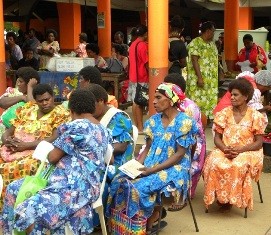International Women's Day Special: Shefa Province
Date:

While the annual UN Commission on the Status of Women, is convened in New York, and governments and civil society dialogue and commit to “Empower Rural Women – End Hunger and Poverty”, the Shefa Provincial Government (SPG) in Vanuatu is planning a long term project that builds on previous commitments to promote gender equality and develops the full potential for women to lead and benefit from the innovations in markets.
The SPG has adopted the Millennium Development Goals (MDGs) and the Convention on the Elimination of All Forms of Discrimination against Women (CEDAW) as a framework for planning and delivering services. In particular, SPG is implementing article 14 of CEDAW, which focuses on acknowledging the contribution, and needs of rural women, especially farmers, to access services needed to empower themselves economically and politically. The SPG aims empower women as market farmers and as managers of markets and rural and agricultural enterprises at provincial, district and community levels.
The women and men from the districts and communities of Shefa report that their communities are full of hope that their local government’s commitment, combined with technical support from the United Nations Entity for Gender Equality and the Empowerment of Women (UN Women) and the United Nations Development Programme (UNDP), and a group called Pacific Agriculture Research for Development Initiative (PARDI), will enable them to develop and realize some of the promises of CEDAW and the MDGs in their daily lives and future.
“The new vision and strategies will give women confidence, voice and opportunity to prove how they can lead as farmers, planners and managers” says Dorah Graham Chairlady, Tongoa District market.
Marinda Alben, Chairlady Lamen Bay District market adds “In Epi District, there are many problems of remoteness, communication, transport and community cooperation. There are many gaps to overcome, but this planning for our new project has helped us to see ways for women to work with the area authority, local government and technical staff, to get the recognition, attention and services that we need”
Her colleague, Leah Song, chairlady of Rovo Bay Market, Epi district asserts “ Women are hardworking and productive, but they often lack the education, information and attention they need to break out of a cycle of hard labour, low status and limited cash incomes. Building on what the Shefa provincial government has done already and the enthusiastic response of women, we now see that a breakthrough is possible. We have high hopes and new energy to take home and start immediately.”
A review of all the studies, surveys and literature on rural women, agriculture and markets across the Pacific region, shows clearly that while there has been much lip service and multiple recommendations to mainstream gender and promote rural women’s economic empowerment, little has changed over the past 4 decades, regarding the way agriculture policies and budgets are made, projects are planned and services delivered.
The fresh food markets in cities, towns, provincial and district centres of the Pacific are a clear example of ad hoc development, with little change or improvement in the way markets are planned, managed and developed. The result is that generations of women struggle to get crops to market and raise the cash incomes so vital to meeting basic family needs. Few women farmers are acknowledged and supported to recognize the importance of their work and the value of their contribution to the family and community economy as well as local government revenues.
UN Women and UNDP are providing technical assistance to the Shefa Local Government and to the organisations and leaders of Women market vendors. Government leaders and technical staff will become more gender aware and responsive, while women farmers will be better supported by their families and communities to maximize their production and marketing potential, and to develop their confidence and skills to get directly and permanently involved in planning, budgeting to ensure better services for women farmers, and markets ,that are managed by women, offering them choices and improving the range, quality and returns on their local products.